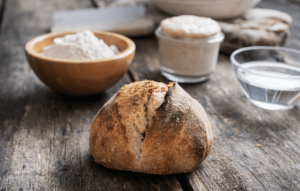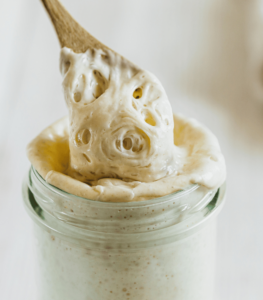Bread has been a staple of the human diet for thousands of years, but over the past few decades, many people have moved away from it primarily due to health concerns. But what if the problem isn’t necessarily bread itself, but the kind of bread we’re eating?
Today we’re looking at our roots in sourdough, a traditional form of bread that’s long been praised for its health benefits and rich, complex flavors. For guys looking to make smarter dietary choices but still enjoy some good ol’ bread, sourdough offers a compelling case to maybe rethink bread. And if you’re really serious about getting the most out of it, making sourdough yourself could be a game-changer for your health and lifestyle.
Why Sourdough Is Different
While most conventional bread is mass-produced with added preservatives, sugars, and commercial yeast to speed up the process, sourdough is created through a natural fermentation process involving wild yeast and lactic acid bacteria. This fermentation not only changes the taste but also fundamentally transforms the nutritional profile of the bread.
Improved Digestibility
The long fermentation process of sourdough essentially begins to break down the starches in the flour before you even take a bite. This pre-digestion can make sourdough significantly easier on the gut compared to traditional bread. For men dealing with bloating, gas, or other digestive discomforts, sourdough can offer significant relief.
The natural fermentation process in sourdough also helps neutralize phytic acid, a compound found in grains that bind to minerals like magnesium, iron, and zinc, making them harder to absorb. Through the reduction of phytic acid levels, sourdough allows for better nutrient absorption, which can have a meaningful impact on energy levels and overall vitality.
Stable Blood Sugar Levels
One of the most compelling arguments for sourdough is its lower glycemic index compared to conventional bread. When you eat a slice of regular white or even whole-wheat bread, it often causes a quick spike in blood sugar, also known as hyperglycemia. This can lead to a crash, resulting in fatigue, hunger, and irritability – pretty much the opposite of what you want to perform and feel your best. Sourdough’s longer fermentation results in lower sugar levels, meaning your body doesn’t need to release as much insulin to deal with it, keeping blood sugar levels steadier.
For the millions of guys who are struggling to maintain consistent energy throughout the day or control their weight, this lower glycemic index can make a real difference.
What’s Wrong with Store-Bought Bread?
If you’re picking up a loaf of bread at the grocery store, chances are pretty high that it’s full of preservatives, sugar, and other additives that do a lot more harm than good. Conventional bread is mass-produced with commercial yeast to quicken the rising process, which bypasses the natural fermentation found in sourdough.
Additives and Preservatives
Store-bought bread is usually designed to last longer on the shelf, so preservatives and other artificial ingredients are common. These additives can disrupt gut health, especially when consumed regularly. For men who want to be mindful of their health, this is a serious red flag – gut health is a major player in immune function, mental health, and even testosterone production.
Missing Out on the Benefits of Fermentation
Without the slow, natural fermentation process, store-bought bread misses out on the probiotic benefits that come with sourdough. These beneficial bacteria aid in digestion and support a healthy microbiome, which plays a role in everything from mental clarity to nutrient absorption.
Benefits of Making Sourdough at Home
So, if you’re coming around to the idea that sourdough is a better choice when it comes to bread, you might consider really taking control of the process by making it yourself. Homemade sourdough allows you to know exactly what’s going into your bread, and it offers benefits beyond just the nutritional – plus, good sourdough can be tough to find these days unless you happen to live near a traditional bakery.
Control Over Ingredients
Making sourdough at home means you can choose organic, high-quality flour, clean water, and quality salt – no unwanted preservatives or additives. It’s the ultimate way to get a cleaner, more nutrient-dense loaf that your body can handle without the downsides of mass-produced bread.

Healthier Environment for Your Gut
The beneficial bacteria in sourdough are naturally produced during fermentation, creating a bread that’s easier for your gut to handle. Sourdough’s lactic acid bacteria help keep the bread fresh and give it that distinct sour taste, which commercial yeast simply can’t replicate. This healthy bacteria can support a balanced gut microbiome, which has far-reaching benefits for men’s overall health.
The Therapeutic Benefits of Baking
Baking bread, especially sourdough, is a skill that requires patience, attention, and dedication. It’s a slow process, but for many, it’s a welcome break from the fast pace of modern life. Making your own bread at home can be surprisingly therapeutic – a way to connect with your food on a deeper level and take pride in creating something from scratch. It’s an opportunity to slow down, focus, and engage in a productive, rewarding task that has real, tangible benefits.
How to Get Started with Sourdough at Home
Making your own sourdough at home is actually a lot easier than you might think. You’ll need a few basic ingredients and tools, but once you get the hang of it, the process can become part of your weekly routine.
- Getting a Starter or Making Your Own: A sourdough starter is a live culture of flour and water where wild yeast and bacteria thrive, and it’s what gives sourdough its unique characteristics. You can either buy a starter or make your own by combining flour and water in equal parts, then “feeding” it daily for about a week until it becomes bubbly and active.

- Basic Ingredients and Tools: To make sourdough, you’ll need high-quality flour (whole wheat or rye works well), water, salt, and your starter. You’ll also need a mixing bowl, a proofing basket, and ideally, a Dutch oven to bake it in for the perfect crust.
- Commitment to a New Habit: Once you’ve got a starter going, it becomes a living part of your kitchen. Maintaining a starter requires feeding it regularly, so you’re committing to a new habit, but it’s one that can bring you consistent benefits. Think of it as an investment in your health – one that pays off with every fresh loaf.
Long-Term Benefits for Men’s Health
Sourdough isn’t just a simple bread choice – it’s a step toward better health and a lifestyle that reflects that. For men looking to take control of their diet without cutting out carbs altogether, sourdough is a sensible and enjoyable way to do it.
Sustained Energy and Better Digestion
With a lower glycemic impact and easier digestibility, sourdough can support steady energy levels throughout the day. Its impact on digestion also means less bloating, discomfort, and better nutrient absorption, giving you more return on what you’re eating.
Self-Sufficiency in Food Choices
In a world where so much of our food is mass-produced and processed, making sourdough from scratch is a reminder of the satisfaction that comes from self-sufficiency. For men who value independence and quality, homemade sourdough represents a powerful choice to step back from commercial options and prioritize health.
Mindful Eating and Greater Food Appreciation
When you put in the time to create something yourself, it changes how you view food. Making sourdough encourages a more mindful approach to eating and can cultivate a greater appreciation for the time and effort that goes into healthy food.

Closing Thoughts
In the quest for better health, sourdough is a clear upgrade over conventional bread. Its unique fermentation process, lower glycemic index, and gut health benefits make it an easy choice for men who want more from their food.
And while buying sourdough from a quality bakery is certainly a step up, making it yourself offers even greater rewards. You get the satisfaction of knowing exactly what’s in your food, the empowerment of self-sufficiency, and the health benefits that come with each homemade loaf.
So, next time you’re craving some bread, consider making or grabbing a loaf of traditional sourdough. It’s a simple, meaningful way to take control of your diet and fuel your body the right way.









